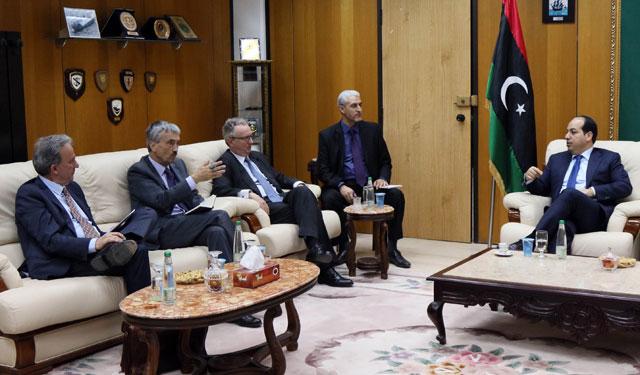You are here
Italian foreign minister meets new leaders in Libya, pledges support
By Reuters - Apr 12,2016 - Last updated at Apr 12,2016
TRIPOLI — Italy's foreign minister made a flying visit to Tripoli on Tuesday to meet Libya's UN-backed unity government, pledging broad international support as the new administration tries to consolidate its presence.
The visit by Paolo Gentiloni was the first by a senior Western official since the arrival in Tripoli nearly two weeks ago of the unity government's presidential council.
Western powers hope the new government can unite Libya's warring factions, end its political chaos and request foreign help to tackle the Daesh terror group and migrant trafficking across the Mediterranean.
Italy, Libya's former colonial ruler, has played a prominent role in rallying support for the new government. After meeting the unity government's leader Fayez Sarraj, Gentiloni told reporters he believed his visit would be "a precedent that other countries will follow".
"We are all studying and discussing the possibility of reopening our diplomatic presence here in Tripoli," he said, though he added that no dates had yet been fixed.
Gentiloni and Sarraj met at the Tripoli naval base where the presidential council has been operating since it arrived in the Libyan capital by ship from Tunisia.
The council has faced resistance in both Tripoli and eastern Libya, the bases for Libya's two rival governments, and its opponents in the capital closed down the airspace to prevent it from flying in.
The council's decision to move to Tripoli had been a "game changer", Gentiloni said. "We do believe that this can pave the way to the stabilisation of Libya."
He noted, however, that the government was still establishing itself, and had yet to be approved by Libya's internationally recognised eastern parliament in Tobruk.
Italy made a first delivrey of food aid and medical kits to the Tripoli area on Tuesday, and plans to deliver assistance to hospitals in the war-torn eastern city of Benghazi, Gentiloni said.
Bilateral meetings over illegal migration, transport links and security assistance were also planned, but counterterrorism planning should be Libyan-led, the Italian minister said.
"If and when the Libyan authorities will ask for international support on security this will be considered, it will be discussed in the Security Council of the United Nations," he said. "It's not something that can be decided in Rome or in London or in Washington."
Sarraj said he was confident about receiving future support from Italy and the international community, and that counterterrorism would be a "priority".
"We will be moving forward from protocol visits to more effective and specialised meetings," he said.
The reopening of diplomatic missions could eventually pave the way for the return of international oil industry staff, though some of Libya's major oil facilities have recently come under attack from Daesh militants.
Western diplomatic staff were evacuated from Tripoli in 2014 amid heavy fighting between rival factions.
The unity government is meant to replace the two rival sets of governments and parliaments in Tripoli and the east. Both were backed by loose alliances of the armed factions that established themselves after the uprising that toppled the late strongman Muammar Qadhafi in 2011.
Related Articles
TRIPOLI — A group of European ambassadors flew into Libya's capital Thursday for the first time since 2014 to support the unity government's
TRIPOLI — UN envoy Martin Kobler said on Sunday his team is in contact with security officials in Tripoli to ensure that Libya's new unity g
ROME — Libya's Vice President Ahmed Maetig has expressed hope that the European Union will enter into an agreement with his country similar

















